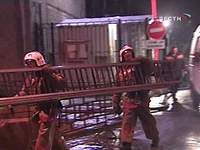Fire at Moscow hospital kills 45 women, arson suspected
A fire broke out in a women's ward of a Moscow drug treatment hospital early Saturday. The fire filled the ward with heavy smoke and killed 45 women who found themselves trapped between the fire and a locked gate, officials said.

Click here to see the photo report of the tragedy
It was the deadliest fire in the Russian capital in three years.
Russia's chief fire inspector, Yuri Nenashev, said he was "90 percent certain" that the fire was caused by arson. But Moscow city prosecutor Yuri Syomin said that investigators were looking into other possibilities, the ITAR-Tass news agency reported.
The fire erupted in a wooden cabinet in a kitchen at one end of a corridor on the hospital's second floor - a factor that led to suspicions of arson - and the only other exit, at the other end, was blocked by a locked gate, Nenashev said. The barred windows were shut with locks that hospital personnel could not open.
All 45 women were already dead by the time firefighters arrived, said Alexander Chupriyanov, the deputy emergency situations minister.
"Judging by the placement of the bodies, they really tried to get out," he said.
Moscow fire department spokesman Yevgeny Bobylyov said that investigators were still working at the site of Hospital No. 17 in southern Moscow but that it was already clear that the first call to the fire department - around 1:30 a.m. (2230 GMT Saturday) had come very late.
"Secondly, the hospital personnel worked very badly, they did not take steps to evacuate people in the early stages of the fire," he said.
One-hundred sixty people were evacuated from the five-story building, and 10 people were hospitalized with carbon monoxide poisoning, Bobylyov said. Firefighters put out the fire within an hour of the first call for help, he said.
Most victims died of asphyxiation, Bobylyov said; some died of burns, Syomin said, according to ITAR-Tass. News agencies reported that two hospital staff members were among the dead.
ITAR-Tass said that the area of the fire was comparatively small, some 100 square meters (1,075 square feet), but that the heavy concentration of smoke killed people. Ekho Moskvy radio said that burning plastic wall coverings had worsened the heavy, toxic smoke.
The fire might have started in a pile of discarded materials, Syomin said.
A few ambulances were lined up outside the hospital, a nondescript, tan brick building in a residential neighborhood in southern Moscow. Reporters were kept well away from the building, set deep in a courtyard, but no obvious signs of fire or smoke damage were visible on the facade.
A van from the city's psychological health service pulled up outside the hospital and a few people went inside, presumably to provide counseling for relatives of the victims. The relatives were brought into the staff entrance to the hospital, well away from reporters. The government also set up a telephone hot line for relatives.
Nenashev said that fire inspectors had visited the hospital twice, in February and March, and that they had recommended the temporary closure of the facility after the second visit because of fire safety violations.
Russia records about 18,000 fire deaths a year - roughly 10 times the rate in the United States and 12.5 times higher than in Britain. Experts say fire fatalities have skyrocketed since the end of the Soviet Union, in part because of lower public vigilance and a disregard for safety standards.
It was the worst fire to break out in Moscow in three years, and emergency response officials ordered that all health facilities in the city be inspected for fire safety compliance, Russian agencies reported. In November 2003, a pre-dawn fire swept though a dormitory for foreign students who had been quarantined for medical checks, killing 36 and injuring nearly 200. Many were trapped behind permanently locked exits, causing some to leap from the five-story building, the AP said.
A January fire in Moscow's main oncological hospital caused the evacuation of hundreds of patients but did not result in deaths or injuries. An October 2005 fire at a home for the mentally ill outside the capital killed seven patients and a fire in a Moscow city hospital the following month killed four.
A fire in a school for the deaf in the southern region of Dagestan killed 28 children in April 2003, in the same week as 22 students burned to death in a wooden schoolhouse in Siberia.
Subscribe to Pravda.Ru Telegram channel, Facebook, RSS!




